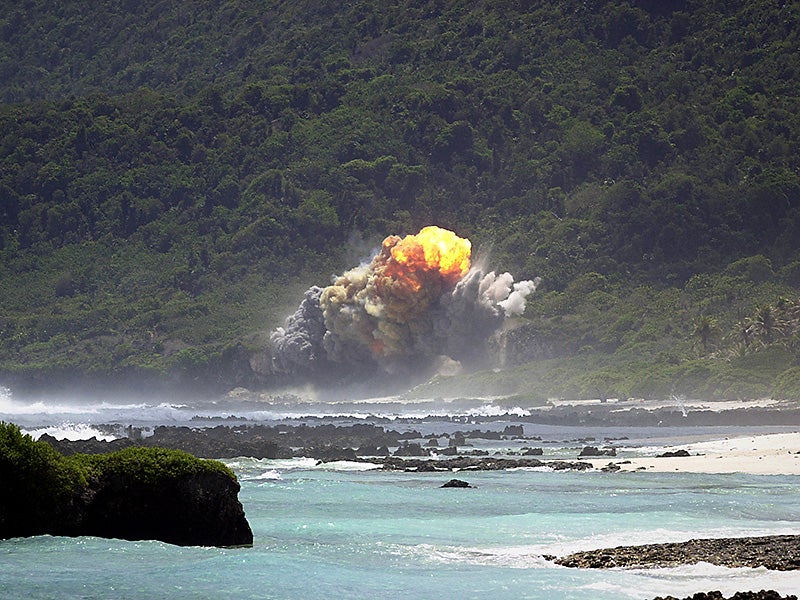U.S. EPA and Guam EPA Express Grave Concerns Over Open Detonation at Andersen AFB, Find Permit Renewal Application Deficient
Open detonation releases toxic chemicals into environment and threatens human health
Contact
Earlier this month, the U.S. Environmental Protection Agency (U.S. EPA) and the Guam Environmental Protection Agency (Guam EPA) identified significant deficiencies in Andersen Air Force Base’s permit renewal application for open burning and open detonation (OB/OD) of waste explosives and required the Air Force to address the deficiencies by September 20th.
The agencies determined that the permit application “fails to meet important aspects” of Guam’s hazardous waste program and, in a letter to Andersen Air Force Base, expressed grave concern about the protectiveness of OB/OD activities. This letter comes after years of advocacy by Prutehi Litekyan: Save Ritidian, which has been ringing the alarm on these severe deficiencies in the permit renewal application since the Air Force submitted it in 2021. One fundamental problem is the Air Force’s failure to evaluate safe alternatives to open detonating waste explosives on Tarague Beach. While the application is pending, Guam EPA has been allowing the Air Force to continue open detonations under a permit that was set to expire in 2021.
“We’re glad to see that U.S. EPA and Guam EPA are finally holding the Air Force accountable to the law. For the last three years, our group has been advocating for a ban on open detonation, pushing for increased protections, and arguing for Guam EPA to deny the Air Force’s permit application,” said Monaeka Flores, a member of Prutehi Litekyan: Save Ritidian. “Our requests to meet with Guam EPA early on were ignored, and our concerns were dismissed by certain military and government officials as ‘sensationalist.’ This letter from both Guam EPA and U.S. EPA has finally validated our efforts and concerns. But this letter should have come three years ago to require the Air Force to evaluate safe alternatives and environmental impacts. Instead, we’ve continued to suffer the harms from open detonations.”
Military bases and private facilities across the country have relied on OB/OD to destroy excess, unserviceable, or obsolete military munitions for decades. OB/OD threatens the environment and human health as these practices result in the uncontrolled release of toxic contaminants — including lead, arsenic, and PFAS — directly into the air, soil, and water. OB/OD facilities collectively burn and detonate millions of pounds of munitions and other hazardous waste in the open air as part of their day-to-day operations. There are currently 67 OB/OD facilities operating in the United States, including Guam.
The Air Force has never conducted the legally required environmental reviews for OB/OD operations at Andersen Air Force Base, despite the potentially significant harm to the surrounding environment, violating the National Environmental Policy Act and hazardous waste law. The OB/OD site lies on a beach sandwiched between the Pacific Ocean and the jungle. It also sits above a shallow, unconfined aquifer. OB/OD operations directly threaten the aquifer, which supplies drinking water to more than 80% of Guam’s population. Contaminants also could enter the ocean, harming local families that frequent nearby beaches and culturally significant fishing sites.
“The law prohibits OB/OD of waste explosives when there are safe alternatives,” said Thien Chau, senior associate attorney at Earthjustice. “It’s long past time for Guam EPA to deny the permit and put an end to open detonations on Tarague Beach.”
The former Guam EPA administrator stated at a legislative hearing last year that, working with U.S. EPA, Guam EPA identified multiple alternatives for safe disposal of the waste explosives at Andersen Air Force Base, and reports by the U.S. EPA and National Academies of Sciences published in 2019 concluded that alternatives to OB/OD are available.

Additional Resources
About Earthjustice
Earthjustice is the premier nonprofit environmental law organization. We wield the power of law and the strength of partnership to protect people's health, to preserve magnificent places and wildlife, to advance clean energy, and to combat climate change. We are here because the earth needs a good lawyer.